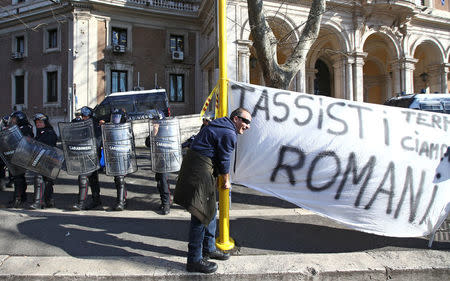Italian taxi drivers protest, urge crackdown on competitors
ROME (Reuters) - Italy's taxi drivers staged a sixth day of protests in major cities on Tuesday and blocked central Rome to try to force the government to crack down on burgeoning limousine businesses and the app-based Uber service. The taxi revolt broke out last week when the ruling Democratic Party (PD) said it would delay yet again introducing norms aimed at regulating car-hire and car-share schemes. Taxi drivers operate under rigid regulation and say they are being penalised by the growth of little-monitored app-based services like Uber, which connect users to the nearest drivers via smartphone, and increasingly popular chauffeured limousines. "We don't mind competition, but there isn't a level playing field. These companies don't have the same constraints as us," said Paolo Ricci, a taxi driver protesting outside the prime minister's office in the heart of Rome. "We are a public service. We have fixed fares, fixed shifts and have to take any customer, even if it is only a short ride that makes no money. The competition don't have any of these problems and the government must act," he said. The protest coincided with a demonstration by market and stallholders, who are up in arms over plans to implement the European Union "Bolkestine" directive aimed at opening up competition within the services sector. While one group of protesters closed roads around the prime minister's office, another crowded around the entrance to the nearby PD headquarters. "Mafiosi, mafiosi," the men shouted. "Let's work together, but without any violence and threats," said Transport Minister Graziano Delrio, who is due to meet the taxi driver leaders later on Tuesday. The government looked to regulate the whole sector in 2008, but the initiative was struck down by the courts. The introduction of subsequent revisions to the law has been repeatedly delayed by successive governments. Deputy Transport Minister Riccardo Nencini said that the delays had been excessive but that the norms had been made obsolete by evolving technology and needed further review. "Reform is essential, but without penalising taxi drivers who have invested in their profession," he told Corriere della Sera newspaper. The taxi unions are a strong lobby group in Italy and have repeatedly fought off attempts to liberalize the industry and increase the number of cab licenses available. Licenses are often passed down from father to son and, according to drivers, they sell for six-figure sums in the major cities. (Reporting by Crispian Balmer; Editing by Hugh Lawson)

 Yahoo News
Yahoo News 



